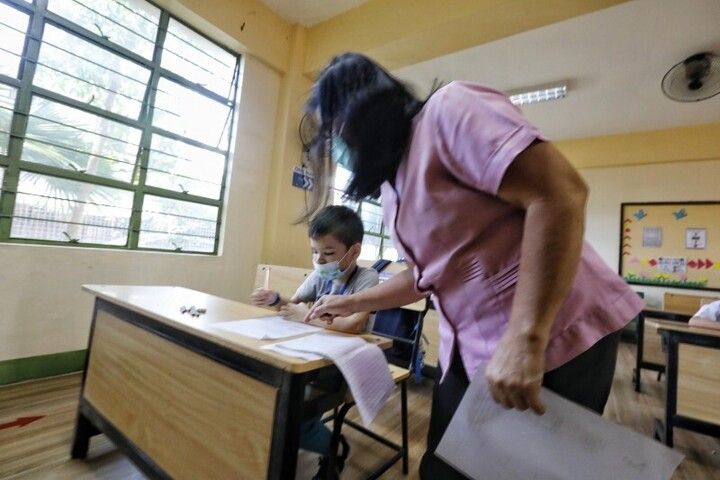EO promotes teachers’ career progression

MANILA, Philippines — To promote professional development and career advancement among state educators, President Duterte has issued an executive order that creates five new teaching positions and promotes an expanded career progression for public school teachers.
Executive Order 174 institutionalizes a merit-based promotion for public school educators where teachers need not wait for a vacant position to get promoted.
Signed on Thursday, EO 174 creates new position titles Teacher 4, Teacher 5, Teacher 6, Teacher 7 and Master Teacher 5, with a directive to the Department of Budget and Management to include the new teaching posts in the government salary grade index.
The classroom teaching career line shall be Master Teacher 1, Master Teacher 2, Master Teacher 3, Master Teacher 4 and Master Teacher 5 while the school administration career line shall be School Principal 1, School Principal 2, School Principal 3 and School Principal 4.
Department of Education (DepEd) Undersecretary Nepomuceno Malaluan had said the four new positions – Teacher 4, 5, 6 and 7 – have corresponding wages of Salary Grade 14, 15, 16 and 17, respectively.
The education department has welcomed the new executive order, calling it a “timely issuance.”
“DepEd, which is coincidentally celebrating its 124th founding anniversary today (Thursday), is grateful to President Rodrigo Roa Duterte for this monumental policy that will expand the classroom teaching career line and provide merit-based career progression opportunities,” it added.
For its part, the Alliance of Concerned Teachers (ACT) said it welcomes some aspects of the new executive order but “there is still no substitute for the salary hike that the teachers have been repeatedly demanding.”
“This executive order is OK to some extent but we hope that this EO would not be used as an excuse for no longer granting the demand of teachers for a substantial salary increase,” ACT secretary-general Raymond Basilio said in a press statement.
The group yesterday held a protest in front of the DepEd Central Office in Pasig City and gave a “failing grade” to outgoing Education Secretary Leonor Briones over the supposed failure to address the education crisis and promote the welfare of teachers.
“For six years, Sec. Briones has outrightly contradicted our call for substantial salary increase, instead of supporting it. The release of our benefits were most delayed under her leadership, and she even refused to compensate the 77 days of extra work that she made us render last school year,” ACT spokesperson Vladimer Quetua said.
USAID donation
The United States government, through the US Agency for International Development (USAID), recently handed over to the DepEd teaching and learning resources to support the agency’s early grade learning initiatives for Filipino children.
USAID director of the Regional Financial Services Center Bret Campbell led the turnover to DepEd Undersecretaries Malaluan and Diosdado San Antonio.
The resources included USAID-developed teacher training materials, literacy and numeracy packages, early grade reading materials and materials supporting literacy assessment.
“We are happy to accept the materials, which is symbolic of the strong partnership between DepEd and USAID. In this partnership, we have sought common aspirations, as well as shared commitment,” Malaluan said.
ACT backs K-12 review
Assistant Minority Leader and ACT Teachers Rep. France Castro has backed calls to review the Enhanced Basic Education Act or the K-12 Law to unearth some problems in the education system.
Castro said an investigation is needed to look into the “roots of the issues, including the inadequate salaries of teachers and other education personnel and the chronic underfunding for the requirements of basic education.”
“The K-12 program did not enhance the curriculum of basic education. It simply mandated additional two years of high school and even condensed lessons to the pupils, leaving behind many,” she said.
Castro said issues like the clamor of teachers, students, education-support personnel and parents on the effects of the shortages, under-funding and low salaries caused by the K-12 implementation should be heard.
“The budget for the K-12 program has been increasing every year without addressing perennial problems of shortages in classrooms, learning materials, teachers and education support personnel, among others,” she maintained. – Elizabeth Marcelo, Michael Punongbayan, Sheila Crisostomo
- Latest
- Trending
































